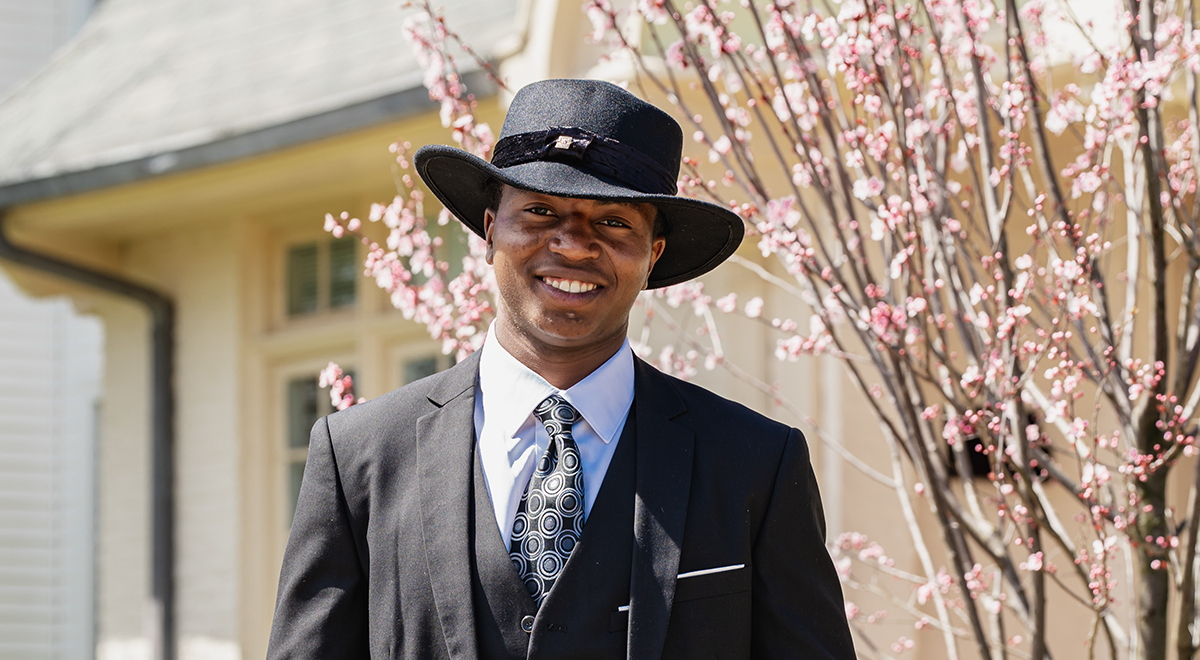Student’s Agricultural Project in Rwanda Wins Davis Projects for Peace Grant

When Gad Nkurunziza ’27 excelled in sixth grade in the Burera district of Rwanda, his school’s headmaster gave him a chicken for his academic achievements. That single chicken introduced Nkurunziza’s family to poultry farming and transformed their lives, he said. Soon, Nkurunziza will bestow the same gift onto other families in his village, with the hopes it will help bring prosperity to his home community.
“We as youths are able to not only impact our own lives, but also impact others,” Nkurunziza said. “I believe that society can change for the better. This [can] be done if we put creativity and innovation at the forefront.”
His Youth AgriChange Network (YAN) project, which promotes societal improvement, received a 2024 Davis Projects for Peace grant—a $10,000 gift designed to encourage student leaders to develop innovative, community-centered, and scalable solutions to the world’s most pressing issues. The Davis Project for Peace grant is administered by the Patricelli Center for Social Entrepreneurship.
Nkurunziza hopes the project will help to reduce youth unemployment, alcohol consumption, and the high rate of malnutrition diseases in Burera.
“The whole idea of this started from me receiving a gift from someone because I was able to excel academically,” said Nkurunziza, one of 13 members of the inaugural Wesleyan African Scholars cohort. “Now I’m giving to the community because I feel an urge to support people in my community. In the end, I measure my value as a community member depending on what I can provide, not on what the community can provide to me.”
Nkurunziza said the gift was a “cornerstone” in his family’s lives. Their initial chicken provided his family with about 15 eggs per month at first. Some eggs hatched and his family quickly had up to 30 chickens. The significant egg yields the chickens provided gave his family consistent protein to eat in order to fight diseases and extra to sell for necessary materials, like shoes and books for school. He said learning poultry farming also taught him to protect what’s important to his family.
“To me, raising a chicken requires commitment and dedication, which I believe fostered my sense of responsibility as a human,” Nkurunziza said.
Giving Back
The project has two main parts: the first part, which is also the focus, will be the “One Chicken Per Family” program. After 3 months, Nkurunziza will give out one chicken per family. He said over 200 families are expected to participate at the start of the program.
“Almost 10 years ago when I was gifted a chicken, we didn’t have enough technology in my village,” Nkurunziza said. “I didn’t have any experience with poultry. Today, I’d be working with different agriculture professionals, poultry farmers, and veterinarians to maintain the well-being and the healthy growth of the chickens.”
The second includes recruiting 20 high-achieving high school graduates, who will be working in the YAN project. After the official start of the project, YAN will partner with veterinarians to provide medical support and community organizations to provide participants with the education and training necessary to sustain proper poultry cultivation to create meaningful, lasting change. The “Agri-Innovate Speakers Program.” will partner with the Bridge2Rwanda program, Rwanda Institute for Conservation Agriculture, and the University of Global Health Equity to empower participants with agricultural knowledge and to inform them of the negative effects of alcohol on social development.
“The YAN aims to focus on the day school graduates and introduce poultry farming as a more accessible route to economic and social mobility,” according to the project’s proposal.
In Rwanda, day school attendees are often overlooked in the job market since they don’t have the same access to skill development as private and public boarding school students or Workforce Development Authority (WDA) schools, Nkurunziza said. While boarding schools and WDA schools cost significantly more to attend, day schools are often attended by students who are from underprivileged families, and they also lack both monitoring and mentoring from their families. The average day school costs approximately $10 per trimester, whereas boarding and WDA schools cost around $100 per trimester, according to the YAN project proposal.
“With a lack of resources like books, and technological devices like laptops, students who graduate from day schools are less likely to be prepared to enter the job market and are more likely to fall below the grade requirements to guarantee entry into Rwandan universities,” the proposal said.
“The Patricelli Center is committed to supporting and amplifying Proximate Leaders—individuals solving issues that they themselves—and the communities they belong to—have faced and are still facing,” Ahmed Badr, director of the Patricelli Center for Social Entrepreneurship, wrote in a statement to The Connection. “Gad Nkurunziza and Youth AgriChange Network (YAN) beautifully represent the best of this mission. We are proud of Gad and look forward to witnessing and supporting his journey towards transforming food access in his home district of Burera, Rwanda.”

